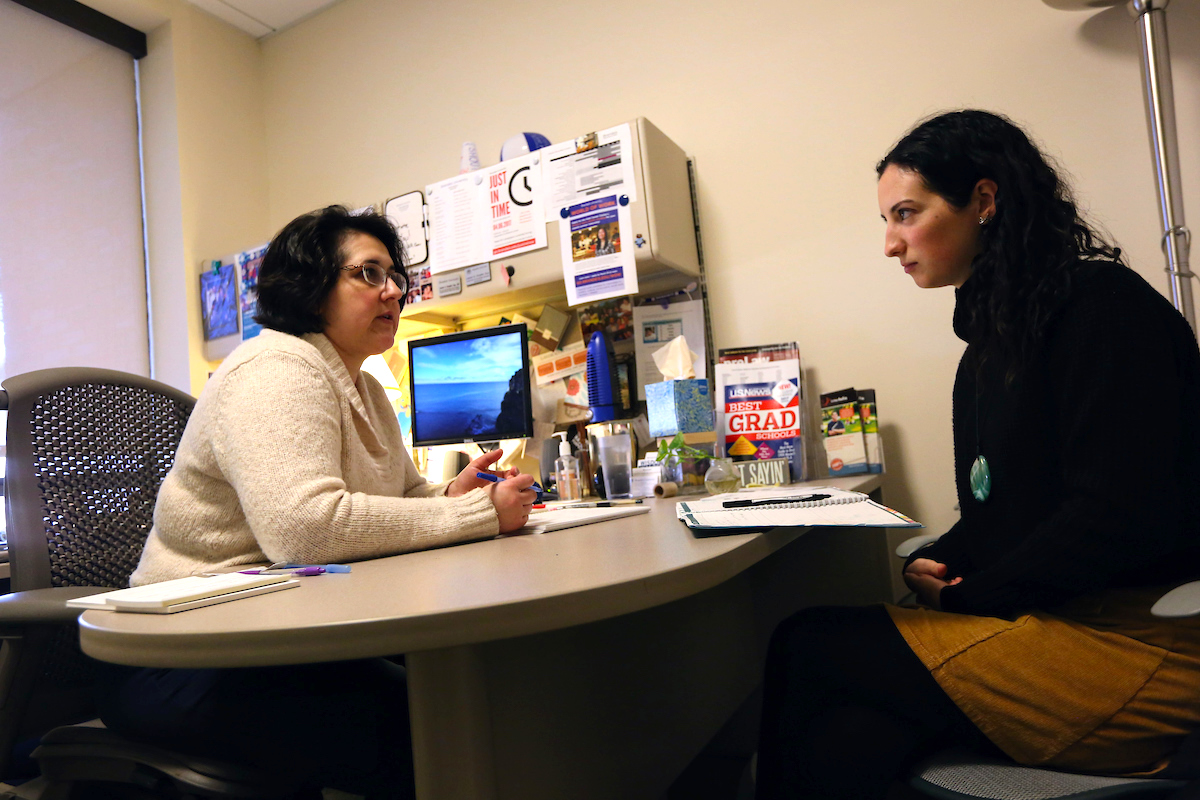Six tips for a pre-law track at Brandeis

Lauren Dropkin speaks with a student in her office
Thinking about applying to law school? Whether you are a first-year student or a recent graduate, making the decision to apply requires careful planning and preparation. We asked Lauren Dropkin '95, Brandeis’ pre-law advisor at the Hiatt Career Center, and Ethan Gerstman '23, a pre-law student who will be attending Fordham Law School in New York City in the fall, for their advice.
Assess Your Readiness and Interest
Before embarking on the law school journey, it is important to assess your readiness and interest in the field, because going to law school requires a significant time and financial commitment, Dropkin says. One way to assess this is to conduct informational interviews with lawyers within your network, whether they are people you know, or Brandeis alumni.
“Mention your interest in law to your friends; perhaps they will have a relative you can speak with,” Dropkin says. The Hiatt Career Center also launched the platform “Rise Together," a platform with profiles of Brandeis alumni who are ready to speak to current students about their careers. This is a great option if cold emailing is something you are uncomfortable with.
Choose the Right Major
There is no “right major” for going to law school. “Consider what you are passionate about because each major will prepare you for law school in a unique way,” says Dropkin. For example, if you are a biology student, that experience may help you to get into a law career relevant to the science industry. Brandeis’ legal studies program, which is popular amongst many students considering a career in law, offers a minor and many other opportunities for students.
Gerstman is currently pursuing a degree in both history and politics. “History has always been an interest of mine, I probably would have applied to History PhD programs if I did not want to be a lawyer,” said Gerstman.
Participate in Extracurricular Activities
“Law school does not want you to be a brain in a jar,” says Dropkin. Participating in extracurricular activities can help you develop important skills such as leadership, teamwork, and communication. Dropkin recommends that students join a few clubs they are interested in and be involved. For example, Gerstman is a film critic for the Justice, Brandeis’ student-run newspaper.
Prepare for the LSAT or the GRE
An entrance exam such as the Law School Admission Test (LSAT) or the Graduate Record Test (GRE) is currently a crucial part of the law school application process. Most applicants take the LSAT. Preparing for either test can help you achieve a higher score and increase your chances of admission to your dream school.
"You should invest time and effort in preparing for the exam," says Gerstman. He recommends planning out time well while preparing for the LSAT. Register for a test and think about how much time you have between now and your test.
“You should commit a set number of hours per week to study for the LSAT and stick to that plan,” Gerstman says. “There are many online resources for LSAT prep. There is no need to spend a lot of money on [expensive] prep books,” says Gerstman.
Get to Know Your Professors
Building relationships with your professors can help you secure strong letters of recommendation, which are also an important part of the law school application process. “If you want a professor to write a letter for you, take a few classes with them, let them get to know you as a person,” says Gerstman.
Research Law School That’s Right For You
Researching law schools can help you find the best fit for your interests, goals, and qualifications. Consider factors such as location, size, cost, and the areas of law that the school specializes in. “I always want students to apply to a range of schools. Based on your test score and GPA, apply to schools that you are likely to get in and schools that are more of a reach. That way, you will have options at the end of the application process,” says Dropkin.
Dropkin also recommends that students consider whether merit scholarship is important to them. Lawyers in different sectors of the industry get paid differently. For example, a non-profit lawyer may get paid less than a lawyer that works in a large firm. It is important to consider how much debt you will accumulate by the end of law school.
Pursuing law school is a major commitment that requires careful consideration and preparation. But it is never too late to start by connecting with the Hiatt Career Center. “Students can come to me at any point if they are thinking they want to go to law school,” Dropkin says. “We will figure out the best plan for you.”
Categories: Humanities and Social Sciences, Student Life





